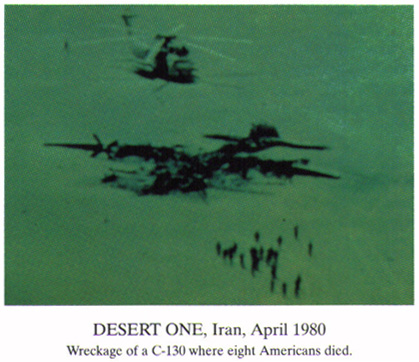
"I think we have an abort situation," Defense Secretary Harold Brown informed President Jimmy Carter on 24 April 1980. Cartel simply responded, "Let's go with his [the ground commander's] recommendation." The mission to rescue 53 American hostages had failed. At a desolate site in Iran known as "Desert One," tragedy occurred minutes later when two aircraft collided on the ground and eight men died. The failed mission struck a blow to American prestige and further eroded the public's confidence in the U.S. government.

The event culminated in a period of Special Operations Forces decline in the 1970s. SOF capabilities had deteriorated throughout the post-Vietnam era, a time marked by considerable distrust between SOF and the conventional military and by significant funding cuts for special operations. The Desert One disaster, however, led the Department of Defense to appoint an investigative panel, chaired by the former Chief of Naval Operations, Admiral James L. Holloway. The Holloway Commission's findings caused the Defense Department to create a counterterrorist joint task force and the Special Operations Advisory Panel.
Desert One did serve to strengthen the resolve of some within the Department of Defense to reform SOF. Army Chief of Staff General Edward C. "Shy" Meyer called for a further restructuring of special operations capabilities. Although unsuccessful at the joint level, Meyer nevertheless went on to consolidate Army SOF units under the new 1st Special Operations Command in 1982, a significant step to improve Army SOF.
By 1983, these was a small but growing sense in Congress of the need for military reforms. In June, the Senate Armed Services Committee (SASC), under the chairmanship of Senator Barry Goldwater (R-AZ), began a two-year-long study of the Defense Department which included an examination of SOF. Two events in October 1983 further demonstrated the need for change: the terrorist bombing attack in Lebanon and the invasion of Grenada. The loss of 237 Marine lives to terrorism, combined with the command and control problems that occurred during the Grenada invasion, refocused Congressional attention on the growing threat of low-intensity conflict and on the issue of joint interoperability.
With concern mounting on Capitol Hill, the Department of Defense created the Joint Special Operations Agency on 01 January 1984; this agency, however, had neither operational nor command authority over any SOF. The Joint Special Operations Agency thus did little to improve SOF readiness, capabilities, or policies - hardly what Congress had in mind as a systemic fix for SOF's problems. Within the Defense Department, there were a few staunch SOF supporters. Noel Koch, Principle Secretary of Defense for International Security Affairs, and his deputy, Lynn Rylander, both advocated SOF reforms.
At the same time, a few visionaries on Capitol Hill were determined to overhaul SOF. The included Senators Sam Nunn (D-GA) and William Cohen (R-ME), both members of the armed services Committee, and Representative Dan Daniel (D-VA0, the chairman of the Readiness Subcommittee of the House Armed Services Committee. Congressman Daniel had become convinced that the U.S. military establishment was not interested in special operations, that the country's capability in this area was second rate, and that the SOF operational command and control was an endemic problem. Senators Nunn and Cohen also felt strongly that the Department of Defense was not preparing adequately for future threats. Senator Nunn expressed a growing frustration with the Service's practice of reallocating monies appropriated for SOF modernization to non-SOF programs. Senator Cohen agreed that he U.S. needed a clearer organizational focus and chain of command for special operations to deal with low-intensity conflicts.
In October 1985, the Senate Armed Services Committee published the results of its two-year review of the U.S. military structure, entitled "Defense Organization: The Need For Change." Mr. James R. Locher III, the principle author of this study, also examined past special operations and speculated on the most likely future threats. This influential document led to the Goldwater-Nichols Defense Reorganization Act of 1986.
By spring 1986, SOF advocates had introduced reform bills in both houses of Congress. On 15 May, Senator Cohen introduced the Senate bill, co-sponsored by Senator Nunn and others, which called for a joint military organization for SOF and the establishment of an office in the Department of Defense to ensure adequate funding and policy emphasis for low-intensity conflict and special operations. Representative Daniel's proposal went even further - he wanted a national special operations agency headed by a civilian who would bypass the Joint Chiefs and report directly to the Secretary of Defense; this would keep Joint Chiefs and the Services out of the SOF budget process.
Congress held hearings on the two bills in the summer of 1986. Admiral William J. Crowe, Jr., Chairman of the Joint Chiefs of Staff, led the Pentagon's opposition to the bills. He proposed, as an alternative, a new special operations forces command led by a three-star general. This proposal was not well received on Capitol Hill - Congress wanted a four-star general in charge to give SOF more clout. A number of retired military officers and others testified in favor of the need for reform.
President Ronald Reagan approved the establishment of USSOCOM on 13 April 1987. The Department of Defense activated USSOCOM on 16 April 1987 and nominated General Lindsay to be the first Commander in Chief (USCINCSOC). The Senate accepted him without debate.